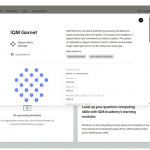Quantum News Briefs: April 12, 2024: Quantonation Ventures Sets New Standards with First Closing of Its Second Early-Stage Quantum Tech Fund; SEEQC Receives Award from the United States Department of Energy to Produce Amplifiers for Fundamental Physics Research and Quantum Computing; SoftBank Corp. Uses SandboxAQ’s AQtive Guard to Identify Undetected Security Vulnerabilities in Existing IT Infrastructure; Oxford University Physics Find New Results promise secure quantum computing at home; “The VC View: Quantonation’s Deep Dive into Funding Quantum Start-ups”

Quantum News Briefs: April 12, 2024: Press release summaries below:
Quantonation Ventures Sets New Standards with First Closing of Its Second Early-Stage Quantum Tech Fund
Quantonation Ventures announced the initial closing of its second quantum technologies-focused fund, Quantonation II, with €70 million raised towards a €200 million goal. This new fund follows the success of Quantonation I, which raised €91 million and invested in 27 companies globally, including spin-offs from prestigious institutions like MIT and Oxford University. Quantonation II will continue the strategy of investing in early-stage quantum tech companies, aiming to fund 25 new ventures. The fund has already made investments in four companies, spanning areas such as quantum computing and materials for energy storage. Notably, a U.S.-based investment vehicle has been established to facilitate participation from American investors. The fund’s strategy also involves collaborating with quantum venture studios worldwide to foster the creation of new companies, focusing on sectors like health, security, and energy.
SEEQC Receives Award from the United States Department of Energy to Produce Amplifiers for Fundamental Physics Research and Quantum Computing
![]()
SEEQC, a quantum computing digital chip company, has been selected by the Department of Energy to develop superconducting quantum interference devices (SQUIDs), which are highly sensitive magnetometers used in various fields, including dark matter detection and medical imaging. Supported by a $200,000 Small Business Innovative Research grant, the project aims to produce a SQUID amplifier that is ultra-sensitive, low power, and low noise, enhancing fundamental science research in areas like dark matter and cosmology. This initiative will also contribute to the next-generation cosmic microwave background experiment, CMB-S4, involving extensive surveys with superconducting detectors to explore fundamental physics. Daniel Yohannes, the project’s principal investigator, highlights the importance of superconducting circuitry and cryogenics in advancing quantum computing and sensing technologies. The development of these SQUIDs not only supports advanced scientific research but also has practical applications in fields such as medical imaging, where their extreme sensitivity can significantly improve diagnostic capabilities.
SoftBank Corp. Uses SandboxAQ’s AQtive Guard to Identify Undetected Security Vulnerabilities in Existing IT Infrastructure
![]()
SandboxAQ has successfully implemented its AQtive Guard cryptography management platform with SoftBank Corp., enhancing cybersecurity against AI and quantum computer-based threats. During testing, AQtive Guard identified multiple cryptographic vulnerabilities within a local government network monitored by SoftBank, including outdated encryption methods and vulnerable certificates. The platform’s comprehensive monitoring capabilities enabled SoftBank to address these issues effectively, incorporating advanced features such as single sign-on, audit logging, and horizontal scaling. This deployment aligns with global shifts towards secure post-quantum cryptography in response to potential future threats posed by quantum computing advancements. SoftBank’s collaboration with SandboxAQ on this and previous projects demonstrates a proactive approach to adopting robust cryptographic standards and preparing for a quantum-resilient future.
Oxford University Physics Find New Results promise secure quantum computing at home

Scientists at Oxford University Physics have made a significant advancement in quantum computing that ensures enhanced security and privacy, making the technology accessible to millions via cloud-based applications. Published in Physical Review Letters, their research introduces a new method of “blind quantum computing,” which allows users to securely execute computations on remote quantum computers without revealing their data or computational methods. This advancement addresses major concerns about data privacy and security in quantum computing, which is particularly vital as the technology becomes more powerful and widespread. The method also verifies computations’ authenticity, promising a more secure integration of quantum computing into fields like healthcare and finance, where data sensitivity is paramount. This breakthrough, supported by a network of international universities and the UK Quantum Computing and Simulation Hub, could revolutionize how quantum computing is used in everyday applications, ensuring scalability and security.
In Other News: HPCWire article: “The VC View: Quantonation’s Deep Dive into Funding Quantum Start-ups”
During a recent interview in an HPCWire article, Will Zeng from Quantonation articulated the venture capital firm’s strategic approach to investing in the burgeoning field of quantum technologies. Emphasizing a specialized focus, Quantonation leverages its profound expertise in quantum physics to identify and nurture startups that show promise in quantum computing, networking, and sensing. The firm’s investment strategy is deeply rooted in understanding and driving the interlocking ecosystem of these technologies, targeting companies with solid technological innovations and strong market potential. Zeng highlighted the early-stage nature of the quantum market but expressed optimism about its accelerated development and significant industry impact. Quantonation aims to transform cutting-edge science into profitable commercial applications, positioning itself as a pivotal player in shaping the future of quantum technology deployment.




















